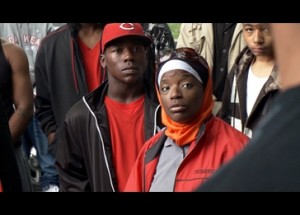By Molly Secours

When I first met Terrence he was 16 years old and had already been living in a Nashville Juvenile prison for four years. Arrested at 12 years old for fatally shooting a 40-year old man during a ‘drug deal gone bad,’ Terrence had the dubious honor of being dubbed ‘Davidson County’s youngest murderer’ and one of the youngest inmates ever to be incarcerated in the state of Tennessee.
As a 16 year old, Terrence possessed a quiet intelligence and harbored a passion (and talent) for writing that was cultivated and nurtured by an English teacher in prison. At the time, I was teaching a life skills course in the juvenile facility, and because of Terrence’s enthusiasm, we decided to write a screenplay together as a class.
The first week the youth were instructed to write an outline, a list of characters and bring four pages of dialog to our next session. The following week, most of the students had either forgotten or refused to complete the assignment — except for Terrence. He came to class with 40 handwritten pages of a screenplay with dialog that rivaled any episode of The Wire in terms of authenticity, intensity and drama.
Terrence’s writing skills garnered him high praise and a prize after one of his essays was published in a regional magazine. In the essay, Terrence expressed regret and remorse for having taken a man’s life at the age of 12.
After reading the essay, members of the victim’s family visited Terrence in prison and began writing to him, sending him birthday cards and following his progress.
When Terrence became a legal adult, in spite of the forgiveness he received from the victim’s family and the numerous pleas on his behalf to release him — including the prosecuting attorney in his original case who felt it would be a waste to sentence someone so promising to adult prison — Terrence was transferred to state prison where he remained until the age of 25.
Having been raised and socialized in prison, these last two years of ‘freedom’ for Terrence have been frightening, stressful and filled with rejection. In the worst economy in decades, getting a job for a convicted felon with no degree and/or marketable skills, is nearly impossible.
I asked Terrence once if he ever imagined how things might have worked out differently, or if he ever wondered what would have happened if someone had interrupted him on the way to selling drugs that day?
“Do I think about it? Only every day.”

It was Terrence I had in mind while watching The Interrupters at the 2011 Nashville Film Festival last spring. Directed by Steve James (Hoop Dreams) and shot over the course of a year in Chicago, the film premieres tonight on NPT at 8:00 p.m. via Frontline, It follows Ameena and two other interrupters, Eddie Bocanegra and Cobe Williams, as they attempt to intervene before situations turn violent: two brothers threatening to shoot each other; an angry teenage girl just home from prison; a young man heading down a warpath of revenge.
Many of the interrupters have previously lived lives of crime, some have actually done prison time, but most essential is they all possess some heavy-duty street cred that will garner them trust and respect in volatile situations.
As I was leaving the Interrupters screening that day, I contacted Ron Johnson, Director of Nashville’s Oasis Center R.E.A.L program (Reaching Excellence As Leaders) and asked him if he’d seen the film. As someone who was the oldest of 10 boys raised in Memphis housing projects carrying a pistol from a young age, Johnson has some street cred of his own. After managing to make it into the NFL and being released for unprofessional behavior, Johnson began selling drugs and served 4 years in a federal prison.
Like the interrupters in the film, Johnson now devotes his life to intervening before violence occurs and sharing hard-earned wisdom from the streets with young people like Terrence — before it’s too late. He said that watching the film gave him hope, and although he knew there were others out there doing similar work, it was inspiring and encouraging that just a few hours away in Chicago were people like Ameena, Eddie Bocanegra and Cobe Williams.
What is clear from watching The Interrupters is that anyone willing to dedicate his or her life to disrupting violence must be part visionary, part counselor and perhaps even part-crazy. It takes someone capable of seeing above, below and beyond hopelessness of someone like Terrence, that is often the root of violence. And it takes someone with keen vision to see through a person’s past (also like Terrence) who might have just what it takes, to become an interrupter himself.
But after seeing the film it’s clear that mostly, being an interrupter requires heart. How appropriate that The Interrupters premieres today, Valentines Day.
* * *
Molly Secours is a writer/filmmaker/speaker who has used her artistic talents to effect social change and public policy regarding inequities in health care, education, criminal justice and more. Her writings have appeared in mainstream and internet magazines and newspapers and she has appeared on local and national television and radio talk shows including CNN’s Paul Zahn Now. She is a weekly co-host of “Freestyle” with veteran Nashville journalist Ron Wynn.
As a Cancer survivor, Secours writes about many issues from a healing perspective and draws the parallels between battling a deadly disease and confronting and disrupting systemic and institutional privilege–a symptom of an imbalanced and unhealthy society. Through her film company “One Woman Show Productions” and her documentary films, Secours has earned national recognition in the world of social justice. In addition to winning high praise amongst community leaders and organizations–locally and nationally–she is committed to producing powerful and cost effective promotional videos for non-profit organizations aimed at raising funds and/or effecting public policy. With a clear voice and a loaded camera, she inspires youth (and adults) to challenge and effect change in their own communities.